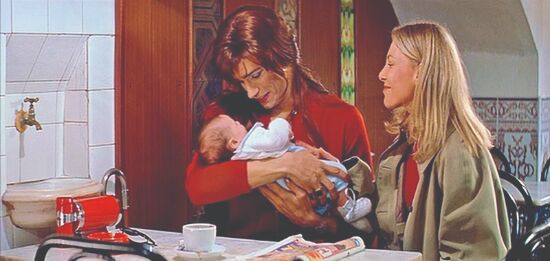"All about my Mother" | An ode to motherhood
Director: Pedro Almodovar
Star Cast: Cecilia Roth, Marisa Paredes, Candela Peña
‘… to all women who act, to men who act and become women, to all who wish to be mothers, to my mother’. Pedro Almodovar’s film, ‘All about my Mother’ draws the curtain with this heartfelt note. Incidentally, the revolutionary Spanish film director’s beloved old mother breathed her last after a prolonged illness, later in the same year. Eulogising about his mother’s influence on him, he once expressed, ‘My mother was always the territory where everything happened.’
Using his trademark technicolour, what he describes as ‘colours of his childhood’, Pedro narrates a lurid story where his characters appear outlandish but very honestly calibrated. The script moves parallelly with the famous Tennesse William’s play, ‘A Streetcar Named Desire’. So, like theatre’s Sisyphean performance of quotidian life, the actors here repeatedly plunge in and move out of it. Pedro won the ‘Best Director’ award at Cannes for his queer and feminist homage to motherly instincts. ‘All about my Mother’ took home the Academy Award for ‘Best Foreign Language Film’ in 1999.
Esteban (Eloy Azorin), an aspiring writer and an admirer of flamboyant actresses, shares a deep bonding with his mother, Manuela, a middle-aged nurse. The teenage son, besides enjoying films and theatres together with her mother, still pleads her to read out from a book like his every previous birthday night, this time the preface of Capote’s book. Yet, Manuela holds back the information about Esteban’s father, who by then turned into a woman, Lola (dead name, Esteban). But in a cruel twist of fate, Esteban dies on his birthday, right in front of her mother in a tragic car accident while attempting to collect an autograph from the renowned stage actress Huma Rojo (Marisa Paredes). Devastated Manuela, gathering all her courage to donate his son’s heart, decides to return to her root-city Barcelona she left 18 years back with little Esteban. There she meets her old transvestite friend Agrado, a sex worker who introduces her to a young nun, Rosa and stage actor Huma Rojo. The melodrama reaches its peak when Rosa is tested HIV positive and is found to be carrying Lola’s baby, later named Esteban. Dying HIV-positive, transsexual Lola finally appears after Rosa’s death to meet the newborn.
Alberto Iglesius’s tragic soundscape augments the emotional quotient of the souls, suffused with personal loss and pain. Cecilia Roth once again delivers a breath-taking performance by portraying a rare stoicism in Manuela. Penelope Cruz, Almodovar’s precious accompaniment to eight of his films, plays a significant role in her silent suffering. But surpassing all, Antonio San Juan’s witty and warm La Agrado gifts the audience with such a powerful performance that it reaches the humanistic peak of the LGBTQ+ community, breaking the gender stereotype.
The ideation of ‘All about my Mother’ may follow a simple Douglas Sirk-ian path of melodrama but the elements of comedy and drama in a multi-layered narrative depict women of various ages, classes and occupations fighting all catastrophes of lives and other evils of the society with endless courage.



